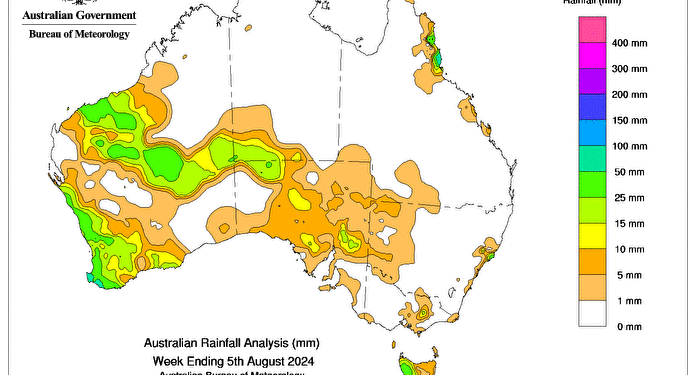Unseasonal Rainfall and Storms Bring Challenges to Key Agricultural Areas in Australia
Australia’s agricultural regions faced a series of weather challenges last week, with unseasonal rainfall, strong cold fronts, and damaging wind gusts impacting crop development and farm operations. These weather patterns have raised concerns among farmers and industry stakeholders about the potential effects on crop yields and quality as the growing season progresses.
In Western Australia (WA), a low-pressure trough brought showers across the South West Land Division, followed by a powerful cold front on July 31. This front delivered additional rainfall, thunderstorms, and damaging winds, affecting agricultural activities in the region. The unseasonal weather didn’t stop there; late in the week, moisture-laden air from the warm Indian Ocean was drawn inland, bringing unexpected rain to WA’s north and the interior of the mainland.
Meanwhile, in Queensland, moist easterly airflow caused showers along the North Tropical Coast and the eastern Cape York Peninsula. These areas recorded some of the highest rainfall totals in the country, with Tully Sugar Mill in Queensland reporting the highest weekly total of 109mm.
Other parts of the country saw varying weather impacts as well. A cold front on August 3 brought showers to southern South Australia and Tasmania, adding to the week’s erratic weather patterns. Despite these localized rain events, much of Australia recorded little to no rainfall during the week, with the notable exception of regions in WA, western Tasmania, and coastal northern Queensland, where rainfall totals exceeded 50mm in some areas.
For Australian farmers, especially those in regions with significant rainfall, these weather events could have mixed consequences. While some rain is beneficial for crops, particularly in the early stages of development, excessive moisture and storms can lead to waterlogging, increased disease pressure, and delays in planting and harvesting. The variability in rainfall also complicates irrigation planning and can lead to uneven crop growth.
As the growing season continues, farmers and industry experts will closely monitor weather forecasts and field conditions to adjust their management practices accordingly. The recent weather events highlight the need for adaptive strategies in agriculture to cope with increasingly unpredictable climatic conditions.
Error




